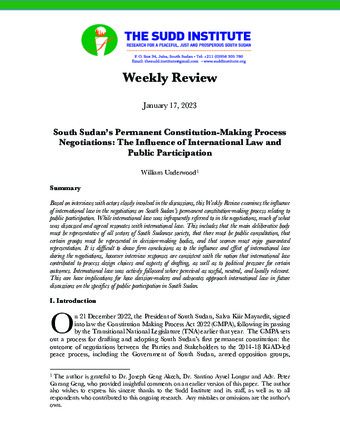South Sudan’s Permanent Constitution-Making Process Negotiations: The Influence of International Law and Public Participation
Publication Summary
Based on interviews with actors closely involved in the discussions, this Weekly Review examines the influence of international law in the negotiations on South Sudan’s permanent constitution-making process relating to public participation. While international law was infrequently referred to in the negotiations, much of what was discussed and agreed resonates with international law. This includes that the main deliberative body must be representative of all sectors of South Sudanese society, that there must be public consultation, that certain groups must be represented in decision-making bodies, and that women must enjoy guaranteed representation. It is difficult to draw firm conclusions as to the influence and effect of international law during the negotiations, however interview responses are consistent with the notion that international law contributed to process design choices and aspects of drafting, as well as to political pressure for certain outcomes. International law was actively followed where perceived as useful, neutral, and locally relevant. This can have implications for how decision-makers and advocates approach international law in future discussions on the specifics of public participation in South Sudan.
William Underwood is a doctoral (PhD) candidate in international law at Stockholm University and a visiting PhD researcher at the Sudd Institute. His thesis examines how international law influences processes of constitutional change after armed conflict. A former Australian diplomat, he holds master’s degrees in international law from the University of Melbourne, and in peace and conflict studies from Uppsala University.

